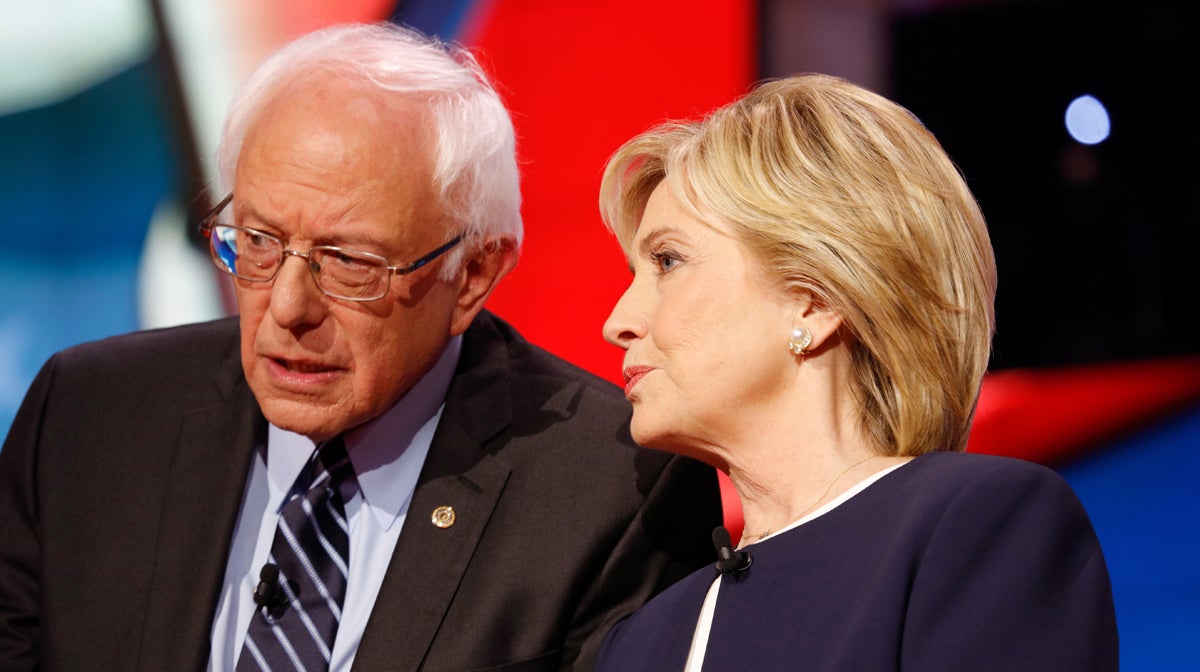Will Hillary’s ‘true firewall’ shield her from getting Berned?

Democratic presidential candidates Bernie Sanders and Hillary Clinton are shown in October 2015. (Image courtesy of Shutterstock.com)
Bernie Sanders fans, especially those who are new to politics, would surely be shocked to learn that Hillary Clinton is crushing their icon in the delegate count. Despite Bernie’s virutal tie in Iowa and his landslide triumph in New Hampshire, he’s trailing badly in the most crucial tally of all.
The lopsided score is: Hillary 394, Bernie 44.
Say what? How is that even possible?
One word: Superdelegates. As a Hillary advisor told CNN, “That is her only true firewall.” She’s currently beating Bernie among superdelegates, 362-8; hence the lopsided score. If Hillary can keep them happy — they’re a populous crew, roughly 20 percent of all the Democratic delegates — Bernie will need to score a lot more landslides in order to win the nomination.
By now you might be wondering: Who the heck are superdelegates, and what makes them super? Put simply, these are establishment insiders — current and former governors and congressmen, top party officials — who can do whatever they want. Unlike the regular delegates, they’re not bound by the primary balloting in their home states. Theoretically, if they believe that the party is poised to nominate an unelectable presidential candidate, they’re free to slam on the brakes and perhaps steer the nod to somebody else.
It would be Bernie’s worst nightmare — and the party’s nightmare as well — if superdelegates doused the flames of his “revolution” and tilted a close delegate race to Hillary. It would inflame his fans’ worst resentments about the party establishment. They’d complain that the fix was in. They’d be tempted to stay home in droves next November, when Democrats would need to be united in order to defeat a Republican nominee who increasingly looks like Donald Trump.
Whoa. Let’s not get too far ahead of ourselves.
Instead, let’s step back: Superdelegates were created by a Democratic reform commission back in 1982 — for good reason. Mindful of George McGovern’s 49-state wipeout in 1972, the party wanted to lower the odds that future ideological activists would hijack the nomination process. The sentiments of the primary voters would remain crucial, indeed determinative, but the superdelegates — establishment free agents — would provide some checks and balances. They’d act in the party’s overall interest, weighing a presidential aspirant’s electability and likely impact on the down-ballot candidates, especially in the swing states.
The Bernie fans who track superdelegates are probably steamed that so many are pledged to Hillary, and that so few are feeling the Bern. But aside from the fact that the superdelegates, seasoned by experience, are smart enough to know that a big-government, higher-tax socialist would be a tough sell in an autumn campaign, there’s another fundamental explanation for their current loyalty imbalance:
Bernie is not a Democrat. He’s an independent who caucuses with the Democrats. Hillary, by contrast, has been a Democratic loyalist since the 1970s. In their day jobs, superdelegates have long worked with her, and she with them. Those things matter. And Hillary has been busy reaffirming those ties; last October, in fact, her campaign manager stated in a memo that “Hillary has more support from superdelegates than all the pledged delegates awarded in Iowa, New Hampshire, Nevada, South Carolina, and a third of delegates awarded on Super Tuesday [March 1] combined.”
But the big question is whether she can sustain that advantage.
Superdelegates are heavy for Hillary at the moment, but if she loses a string of primary contests — if, for instance, Bernie cuts deeply into her assumed strength among minorities in Nevada, South Carolina and beyond — they might dump her. In theory they’re free to frustrate the will of Democratic voters if they feel it’s in the party’s interest to do so, but in practice they’ve never done it. In 2008, lest we forget, a sizable number of Hillary superdelegates jumped to Barack Obama after he won their home states and districts.
So keep your eye on that superdelegate count. If Hillary sustains her edge well into the spring, it’s probably a sign that she’s successfully gutting it out. But if Bernie starts to win big time — in states that were thought to be inhospitable — and if she continues to un-communicate, you’ll see flames licking her firewall.
—
Meanwhile, on the Republican side, we need to acknowledge two new dropouts.
Nine months ago, on May 4, I wrote this about Chris Christie:
The only remaining debate is whether it’s more accurate to describe him as toast or as a headless chicken. I vote for the headless chicken, because that kind of bird can go through the motions of running around for a while before toppling over. Christie’s beleaguered spinners are still insisting that he’s a viable GOP hopeful, that he’s heading for New Hampshire next weekend, that he’ll likely announce a bid this spring, that he’s in it to win it. Yeah, whatever.
I repeat, whatever.
Also yesterday, we said goodbye to falsehood machine Carly Fiorina. In fact, I hear that Planned Parenthood has an exclusive video of Fiorina wriggling on a table, crying out in the agony of defeat.
—
Jane Mayer, the award-winning journalist, has written Dark Money, the breakthrough book about the Koch brothers political empire. I’m hosting her at noon tomorrow, at the Free Library of Philadelphia. Our on-stage conversation will be followed by audience Q & A. Stop by. And it’s free.
——-
Follow me on Twitter, @dickpolman1, and on Facebook.
WHYY is your source for fact-based, in-depth journalism and information. As a nonprofit organization, we rely on financial support from readers like you. Please give today.

